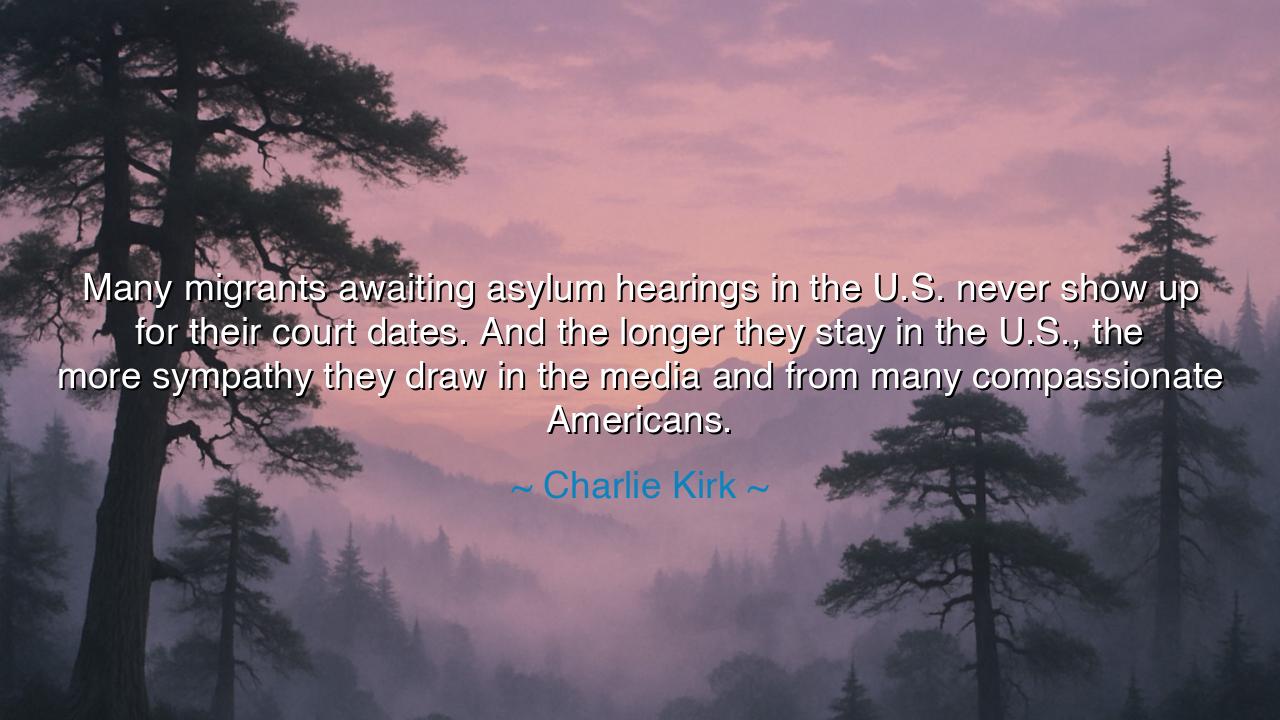
Many migrants awaiting asylum hearings in the U.S. never show up
Many migrants awaiting asylum hearings in the U.S. never show up for their court dates. And the longer they stay in the U.S., the more sympathy they draw in the media and from many compassionate Americans.






Hear the words of Charlie Kirk, spoken in the midst of one of the great debates of our age: “Many migrants awaiting asylum hearings in the U.S. never show up for their court dates. And the longer they stay in the U.S., the more sympathy they draw in the media and from many compassionate Americans.” These words, though born of politics, reach into the ancient struggle between law and mercy, between the order of the state and the longing of the human heart. For every nation must wrestle with this dilemma: how to guard its borders and laws, yet not harden its soul against those who come in desperation.
The meaning of this saying lies in the tension between two truths. On the one hand, the state demands structure—laws, courts, and procedures that give stability to a people. On the other, the migrant embodies vulnerability—the wanderer fleeing hunger, violence, or despair, who seeks refuge in a land of hope. Kirk observes that many who enter the system do not follow its appointed path, yet as they remain, they awaken sympathy, for their faces and stories stir the compassion of those who behold them. Here is the ancient paradox: the law demands judgment, but the heart demands mercy.
This conflict is not new. Recall the story of the Exodus, when Israel wandered as strangers in Egypt. For a time, they were welcomed, but as their numbers grew, fear overcame compassion, and they were enslaved. Centuries later, the prophets of Israel would remind their people: “Remember that you too were strangers in a foreign land.” Thus, the question of how to treat the outsider has always haunted the conscience of nations. To harden one’s heart is to betray humanity; to open it without caution is to risk disorder. Both extremes carry peril.
Consider also the tale of Ellis Island, where waves of migrants once poured into America. Many were poor, unskilled, and distrusted by those already settled. Newspapers railed against them, warning of disease, crime, or foreign ideas. Yet over time, these same migrants became the backbone of cities, the lifeblood of industry, the very families that would later call themselves proudly American. Sympathy, once resisted, became honor. The story shows that compassion and media attention can change not only individual lives but the course of history itself.
Yet Kirk’s words also warn of danger: that sympathy can be manipulated, and that the law, when ignored, loses its power to protect. Just as unchecked compassion may invite chaos, unchecked rigidity may invite cruelty. The challenge for any nation, and for each person within it, is to find the narrow path where justice and mercy walk hand in hand. For if one triumphs fully over the other, both the state and the soul are imperiled.
The lesson then is clear: approach this struggle with both eyes open. Do not allow compassion to be swallowed by fear, nor law to be dissolved by sentiment. When you see the face of the migrant, see not an abstraction but a human being; when you think of the law, see not mere bureaucracy but the structure that holds society together. Wisdom lies not in choosing one and despising the other, but in holding both in tension—seeking solutions that honor the dignity of the person while preserving the strength of the nation.
Therefore, my children of tomorrow, let these words guide you: when confronted with those who wander and those who suffer, let your heart be stirred by sympathy, but let your mind be guided by discernment. Ask not only what is good for the one, but what is good for the many. And remember always that history will judge nations not merely by the strength of their laws, but by the compassion with which they treated the stranger at their gates. For in balancing justice and mercy, a people proves the greatness of its soul.






AAdministratorAdministrator
Welcome, honored guests. Please leave a comment, we will respond soon